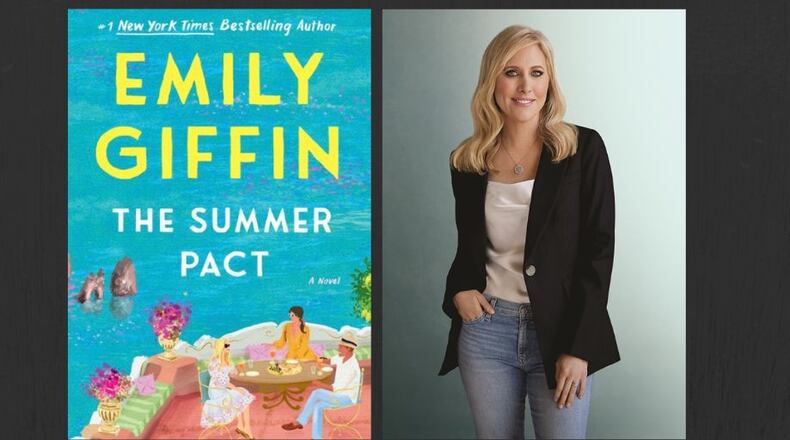As Atlanta novelist and New York Times bestselling author Emily Giffin points out, her new book “definitely has a sex scene in it, and it definitely has romance in it.” But “The Summer Pact” (Ballantine Books, $30) is a departure from her previous novels like “Something Borrowed,” “Love the One You’re With” and “Meant to Be.” While Giffin’s books often deal with topical issues like 9/11 and cyberbullying, they typically revolve around romantic relationships. Not this time.
“This book really is an ode to friendship,” she says, speaking from her best friend’s apartment in New York City.
Whether this change of focus has anything to do with her recent split from her husband of more than 20 years, Giffin isn’t saying. But this she readily admits: “As I was writing this book, I was going through something very difficult, and it really became life imitating art as I leaned on my friendships.”
“The Summer Pact” is about a tight-knit group of chums who suffer the tragic loss of a friend to suicide just as they’re all preparing to graduate college. They promise each other that no matter what, if one of them ever hits rock bottom and reaches out for support, the others will drop everything and be there.
Fast forward 10 years: When Atlanta interior designer Hannah discovers her fiance’s infidelity, she rallies her friends, Tyson, a corporate lawyer, and Lainey, a well-known actress. Coincidentally, they’re experiencing a turning point in their lives, too. Once they work through Hannah’s immediate crisis, they decide to take a series of trips together, starting in Dripping Springs, Texas, to resolve Lainey’s family issues, then Capri and ultimately Paris, where Hannah had planned to honeymoon.
The book starts on a dark note, with the suicide of the trio’s friend Summer, a high-achieving premed student and star athlete.
“I wanted to explore mental health in a way I haven’t before in any of my books,” says Giffin. “Having twin sons who run division one track and cross country, I’ve seen firsthand all the pressure these kids put on themselves. We see in the media time and time again these deaths by suicide by young people who seem to have everything in the world going for them. They’re college athletes, they’re excelling in academics and their sport, and yet they just crumble from the weight of that pressure and the toxic culture of perfectionism.”
Ultimately, though, “The Summer Pact” is about the dynamic of close friendships.
“For many of us, friends are our found family, and they can save us,” Giffin says. “The friends in this book experience that, all of them in different ways.”
Asked about her own friends, Giffin says, “I have various friend groups from different parts of my life. Like I have the school mom friends, college friends and my law firm friends. Unlike these characters, I’ve always been someone who enjoys one-on-one friendships more. So my very closest friends aren’t actually friends with one another. Each of them brings out something different in me.”
“The Summer Pact” is told in alternating first-person viewpoints between the three friends, one of whom — Tyson — is a Black man. Giffin admits she debated with herself and her editor over whether she was up to the challenge of creating a believable Black male character and decided that if she approached it “in a responsible and sensitive way,” she could pull it off. To that end, she solicited the aid of a Black male friend, who read the manuscript and gave her feedback. The publisher also hired a sensitivity reader. In the end she believes the effort paid off, and it was worth it not to have an all-white, all-woman friend group.
“Interestingly, the character that one would think on paper that I’d have the least in common with is Tyson because he’s a Black male, but in many ways, I could relate to him much more than I could relate to the other two narrators. … Tyson comes from an upper middle-class family with professional parents (and) high parental expectations. He went to law school, I went to law school. He didn’t love being a lawyer at a big firm, I didn’t love being a lawyer at a big firm.
“I think this book and the writing of it and the execution of these characters, it reminds me and I hope it reminds us all that we’re more than demographics. Our life experiences are diverse. We have diversity within us. In fiction and in life we gravitate toward the things that unite us rather than the things that divide, and I found that to be the case as I wrote Tyson.”
Emily Giffin will be in conversation with Patti Callahan Henry on July 12 at Atlanta History Center. For details go to atlantahistorycenter.com.
Suzanne Van Atten is a book critic and contributing editor to The Atlanta Journal-Constitution. She may be reached at Suzanne.VanAtten@ajc.com.
About the Author
Keep Reading
The Latest
Featured



